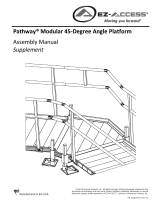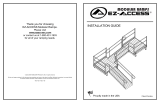
-3-
1.
BASIC SAFETY AND WARNINGS
1.1.
SYMBOL MEANING
WARNING SYMBOL: This symbol may appear in various colors and in conjunction with
other symbols. The WARNING symbol indicates that a failure to obey the warning could
result in property damage, damage to equipment, serious personal injury, or death, as well
as the serious personal injury or death of others.
NOTE SYMBOL: This symbol may appear in various colors and in conjunction with other
symbols. This indicates that a failure to obey all notes could result in improper operation,
less than optimum performance, and at the sole discretion of the manufacturer, may void
your warranty
1.2.
WARNINGS
RATED LOAD: 850 pounds. NEVER EXCEED RATED LOAD.
Do not use ramp if the top lip transition plate is not secured to a structurally sufficient
landing.
Avoid dragging ramp as this will rapidly wear the ramp, may cause damage, and may
shorten useful life.
Always exercise caution when using a ramp.
Use ramp only if both top transition and bottom transition plates are properly supported by
level, stable surfaces.
Use only if supporting surfaces are capable of supporting, at minimum, the same Rated
Load (850 lbs.) as the ramp.
Use only if sufficient maneuvering room is available at both ends of the ramp to assure safe
travel when entering and exiting the ramp.
Ramp will conduct heat rapidly. Do not place on or near open flame or hot objects as burns
may result when using or handling.
If ramp is exposed to heat, hot weather or direct sunlight, use gloves when handling.
Ramps in freezing temperatures will readily freeze any moisture on the walking surface
thereby increasing the risk of slipping.
Ramps reflect light. Use sunglasses, reposition ramp, or paint walking surface with flat-finish
light grey metal primer to minimize unsafe glare during use (use of darker paint/primer will
increase heat buildup of ramp during warm climatic conditions).
Use only if ice, snow, wet leaves and/or other debris (that may decrease traction and
increase the risk of slipping) have been removed from ramp.
Moisture on the ramp surface will decrease traction and increase the risk of slipping. Use
extreme caution when wet.
If angle or traction conditions are deemed unsafe, DO NOT USE ramp!
Inspect ramp regularly for any damage, including bending and cracked or broken welds. If
any part of the ramp is unstable, damaged, or otherwise defective, DO NOT USE!
Aluminum ramps will conduct electricity. Do not use or handle around live wiring or during
electrical storms.
This ramp is intended for people and mobility equipment only. Do not use to transport
freight.
Ramp is for residential use only. Do not use in commercial applications.
Use ramp only with a qualified helper.
Always use your lap belt.
Do not run, jump or play on or around ramp, including climbing on or between the handrails.
Do not use handrails or ramp to support planters, decorations, lights, etc.
An incline chart is provided at the end of this document but is intended as a guideline only. It
is important you refer to your equipment's (wheelchair or scooter) Owner Guide for the
proper degree of incline/decline and chair direction before using ramp. Never exceed its
recommendations.
If any part of the ramp is damaged or loose, DO NOT USE UNTIL REPAIRS CAN BE
MADE BY A CERTIFIED INSTALLER OR OTHER QUALIFIED PERSON.
Read and follow all safety and operating instructions provided by the manufacturer of the
equipment that the ramp will be used with.














